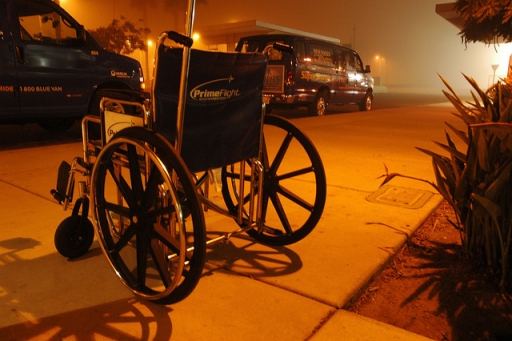Traveling on an airplane is an event whether you are 25 or 75. It involves planning, ordering tickets, packing, the physical act of sitting on a plane for a few hours, and getting adjusted to your new surroundings when you get off the plane. But when you’re 75, these issues become magnified no matter how travel-savvy or healthy you are. Here are some ways seniors can adequately cope with air travel:
Preparation for the Airport & Flight
If an elderly person is traveling alone, most airlines will allow a non-flying companion to escort him to and from the departure/arrival gate. This is something that should be arranged ahead of time, and the companion should make sure to have valid ID.
During the flight, senior travelers may want to get up a number of times, either to stretch their legs and boost circulation or to go to the bathroom. If this is the case, whoever is ordering the tickets should make sure to request an aisle seat at the time you place the order. Seniors may also want to request a seat that is close to the bathroom, or the bulkhead seats for more leg room. Whatever the request, make it known at the time you order the tickets. If you order online and have special needs or concerns, make sure to call the airline to follow up with your requests.
Packing
Seniors should make sure to bring their medications in their carry-on bag, not in their luggage, which can get lost. That being said, they should try to keep their carry-ons as light as possible without giving up on essentials. The lighter it is, the easier it will be to carry it and walk around within the airport.
At the Airport
Seniors over the age of 75 are entitled to go through security without removing their shoes and jackets. They are also entitled to use the disability lane if the airport has one. Seniors are also usually allowed to board the plane before other passengers, so they should listen for loudspeaker announcements calling for early or priority boarding.
After the Flight
If seniors need special assistance, they should not get off the plane with everyone – it will only make them uncomfortable and anxious. Instead, they should wait until the other passengers alight, and then take their time carefully and safely getting off the plane.
Traveling in a Wheelchair
Seniors who travel in wheelchairs should make sure to notify the airlines ahead of time and to tell them what type of wheelchair they have. If a battery needs to be taken out or any other measures need to be taken to ensure the safety of the flight, the airline is responsible for putting the wheelchair back together in working order. Even so, it’s a good idea to label the wheelchair and remove the detachable parts before it’s put on the plane.
Ask for Help
If a senior ever needs any help, in the airport or on a flight, they should make sure to speak up. Many airports have porters to help with luggage, or airport personnel specifically designated to help elderly passengers. If no airport staff is available, seniors can reach out to their fellow passengers – most would be happy to help.
The main thing is for the senior not to stubbornly attempt to do things that are beyond their physical means (such as lifting luggage off the conveyor belt). Flying can be difficult, so minimizing risky activities is important for arriving at their destinations safely.
